Design decisions for buildings and communities are critical to efforts to increase local and regional resiliency. Building designers — of residential, institutional, and commercial structures — should strive to incorporate passive and active survivability concepts into new and renovated structures.
Community planners and developers need to incorporate concepts that increase the capacity to maintain transportation flow, strategies to handle water management, and infrastructure approaches that will withstand a variety of risks.
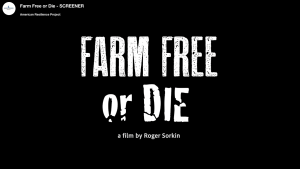
American Resilience Project: Farm Free or Die
“Farm Free or Die,” a film by American Resilience Project, advocates for transformative agricultural policies that improve farming livelihoods and address the climate crisis.
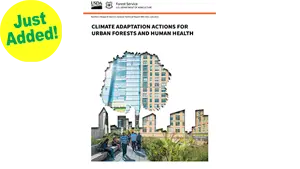
Climate Adaptation Actions for Urban Forests and Human Health
This report synthesizes adaptation actions to address climate change in urban forest management and promote human health and well-being through nature-based solutions. It compiles and organizes information from a wide range of peer-reviewed research and evidence-based reports on climate change adaptation, urban forest management, carbon sequestration and storage, and human health response to urban nature.
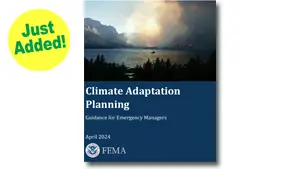
Climate Adaptation Planning: Guidance for Emergency Managers
FEMA’s Climate Adaption Planning: Guidance for Emergency Managers is intended to help state, local, tribal, and territorial (SLTT) emergency managers incorporate climate adaptation into emergency management planning efforts.
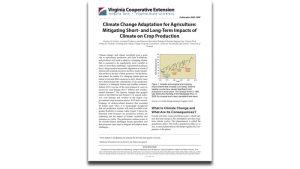
Climate Change Adaptation for Agriculture: Mitigating Short- and Long-Term Impacts of Climate on Crop Production
The Virginia Polytechnic Institute and Virginia State University produced this publication in 2014 outlining climate-related challenges facing agriculture and some options for mitigating and adapting to them. Included in the publication are adaptation strategies and conservation techniques touching on soil water-holding capacity, tillage, crop rotations, drainage, irrigation, nitrogen use, and buffers.
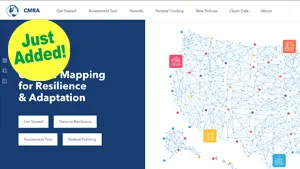
Climate Mapping for Resilience and Adaptation
The U.S. Climate Resilience Toolkit offers a framework to help communities systematically consider and address their climate hazards.
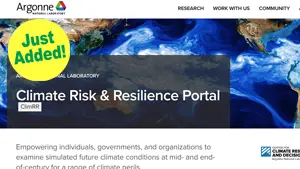
Climate Risk & Resilience Portal (ClimRR)
The Climate Risk & Resilience Portal from Argonne National Laboratory empowers individuals, governments, and organizations to examine simulated future climate conditions at mid- and end-of-century for a range of climate perils.

Envision Rating System for Sustainable Infrastructure
Published in 2015, the Envision system is composed of tools, covering all aspects of a product’s lifecycle, that are meant to introduce sustainability into infrastructure projects.
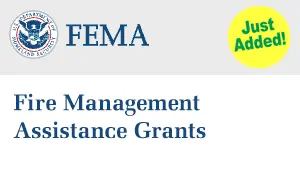
Fire Management Assistance Grants (FMAG)
Fire Management Assistance Grant (FMAG) Program is available to states, local and tribal governments, for the mitigation, management, and control of fires on publicly or privately owned forests or grasslands, which threaten such destruction as would constitute a major disaster.
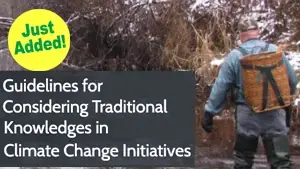
Guidelines for Considering Traditional Knowledges in Climate Change Initiatives
Guidelines for Considering Traditional Knowledges in Climate Change Initiatives is an informational resource for tribes, agencies, and organizations across the United States interested in understanding traditional knowledges—or TKs—in the context of climate change.
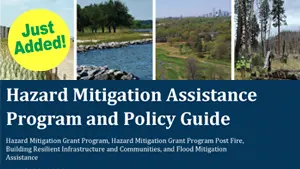
Hazard Mitigation Grant Program (HMGP)
FEMA’s Hazard Mitigation Grant Program provides funding to state, local, tribal and territorial governments so they can develop hazard mitigation plans and rebuild in a way that reduces, or mitigates, future disaster losses in their communities.

American Resilience Project: Farm Free or Die
“Farm Free or Die,” a film by American Resilience Project, advocates for transformative agricultural policies that improve farming livelihoods and address the climate crisis.

Climate Adaptation Actions for Urban Forests and Human Health
This report synthesizes adaptation actions to address climate change in urban forest management and promote human health and well-being through nature-based solutions. It compiles and organizes information from a wide range of peer-reviewed research and evidence-based reports on climate change adaptation, urban forest management, carbon sequestration and storage, and human health response to urban nature.

Climate Adaptation Planning: Guidance for Emergency Managers
FEMA’s Climate Adaption Planning: Guidance for Emergency Managers is intended to help state, local, tribal, and territorial (SLTT) emergency managers incorporate climate adaptation into emergency management planning efforts.

Climate Change Adaptation for Agriculture: Mitigating Short- and Long-Term Impacts of Climate on Crop Production
The Virginia Polytechnic Institute and Virginia State University produced this publication in 2014 outlining climate-related challenges facing agriculture and some options for mitigating and adapting to them. Included in the publication are adaptation strategies and conservation techniques touching on soil water-holding capacity, tillage, crop rotations, drainage, irrigation, nitrogen use, and buffers.

Climate Mapping for Resilience and Adaptation
The U.S. Climate Resilience Toolkit offers a framework to help communities systematically consider and address their climate hazards.

Climate Risk & Resilience Portal (ClimRR)
The Climate Risk & Resilience Portal from Argonne National Laboratory empowers individuals, governments, and organizations to examine simulated future climate conditions at mid- and end-of-century for a range of climate perils.

Envision Rating System for Sustainable Infrastructure
Published in 2015, the Envision system is composed of tools, covering all aspects of a product’s lifecycle, that are meant to introduce sustainability into infrastructure projects.

Fire Management Assistance Grants (FMAG)
Fire Management Assistance Grant (FMAG) Program is available to states, local and tribal governments, for the mitigation, management, and control of fires on publicly or privately owned forests or grasslands, which threaten such destruction as would constitute a major disaster.

Guidelines for Considering Traditional Knowledges in Climate Change Initiatives
Guidelines for Considering Traditional Knowledges in Climate Change Initiatives is an informational resource for tribes, agencies, and organizations across the United States interested in understanding traditional knowledges—or TKs—in the context of climate change.

Hazard Mitigation Grant Program (HMGP)
FEMA’s Hazard Mitigation Grant Program provides funding to state, local, tribal and territorial governments so they can develop hazard mitigation plans and rebuild in a way that reduces, or mitigates, future disaster losses in their communities.
